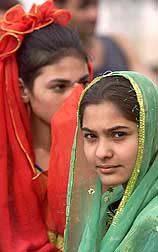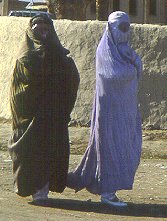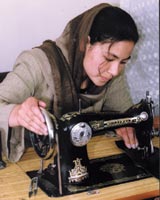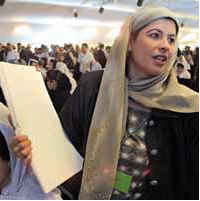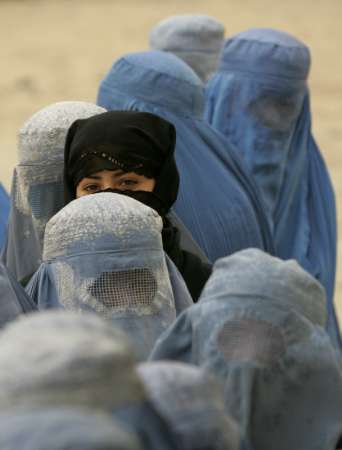 |
||||
|
The War, the Women, the West
By Catherine Sameh
NOT SINCE THE Iranian revolution and the hostage crisis that followed (1978-79) has "the Islamic world" so captured the attention of the U.S. media and its consumers. September 11 and the aftermath have revealed a new chapter not only in the fifty-plus-year history of U.S. geopolitical hegemony in the Middle East, but also the Orientalist discourse that dominates the media's analysis of that involvement.
While the hysterical (the multiple meaning of this word has never been more fitting) "good vs. evil" babble of George W. Bush seems to be repeated only by Bush himself, the mainstream press has substituted the only slightly more sophisticated "East" for "evil" and "West" for "good," framed as a "clash of civilizations" first by Samuel Huntington in the early 1990s. Accordingly, the 9/11 crisis is being explained to Americans as a battle between a democratic, civilized West and the authoritarian, savage East. While the vehemence of this discourse has moderated since the first days after 9/11, and even some room has opened for alternative analyses in the form of sympathetic responses to Arabs and Muslims living in the West and solidarity with "the people" of Afghanistan, this ethnocentric and racist ideology continues to dominate as a nearly constant narrative in American life.
Just look at best-seller lists right now: Accounts abound of Afghanistan and the Middle East by heroic white Western journalists on the front line. Just watch as they follow these small numbers of Islamic fundamentalists around as if they were the Beatles, meanwhile ignoring the thoughtful peace and justice rallies in Pakistan, Iran, Palestine and the United States that don't posit Islam against America but offer a more complex understanding of this crisis. All that makes it tricky to talk about the oppression of Afghan women under the Taliban. While it's easy to dissect the hypocritical ways that (conservative, anti-gay, anti-abortion) George W. Bush has coopted feminist critiques of the Taliban as a means of justifying war against Afghanistan, it's harder to see the many ways that the more progressive, even feminist critiques of the Taliban reinforce the Orientalist discourse that for decades has dominated discussion of the Middle East. Let me be clear that I DO NOT in any way support the Taliban regime as defenders of Afghanistan against neocolonial domination, nor do I endorse a silence from the left on this issue. I strongly condemn the Taliban's oppression of women and all Afghan citizens, as I believe any thoughtful antiwar, global justice movement must.
But I do oppose a decontextualized, exclusively Western discussion of women under the Taliban or the position of women in the Middle East (as if there were one position). From Oprah to "Frontline" to the Feminist Majority, the discussion spins on a highly out-of-context, sensationalist view of Islamic societies and Muslim people—which simultaneously reinforces the Islamic-fundamentalist framing of their political regimes as the one true Islam, and the Orientalist framing of Arab and Muslim societies that further silences women's voices and agency.
Even Afghan women living under gender apartheid are resisting patriarchal control in all sorts of ways, from organizing schools for women and girls to wearing the chador instead of the burqa. We must create space for their narratives, their resistance, their analyses, and we must act in solidarity with them. We should also pressure both mainstream and especially left media to invite into their pages the enormously rich analyses of Arab and Muslim women scholars and activists.
We can also link up with the human rights movement. The concept of women's rights as human rights is not a Western construct, but one established by international movements and conferences where women all over the world have been and still are central actors. We should demand that the Platform for Action of the Fourth World Conference on Women (Beijing, 1995) be implemented and enforced in every country on earth, including Afghanistan. But perhaps the most important thing we can and must do is to link our response to the current crisis to the movement for global justice. This doesn't promise to be easy, as many global justice activists are putting the movement on hold to become antiwar activists. It is the movement for global justice, the most promising of our time, that offers an alternative analysis and vision—against the right-wing and fundamentalist movements in all societies, including our own, and the equally exploitative neoliberal, neocolonial world order being forcibly implemented by the United States and its allies.
|
|
|||
|
|
||||
|
|
||||
 |
|
 |
||
